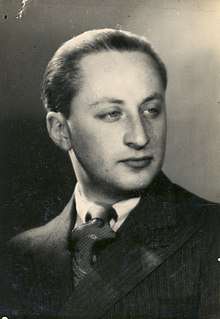Jakob Jonilowicz
Jakob Jonilowicz[1] Hebrew: יעקב יונילוביץ (1908–1975) was an Israeli cinematographer.[2]
Jakob Jonilowicz | |
|---|---|
 | |
| Nationality | Israeli |
| Occupation | Cinematographer |
Jonilowicz was born in Vilna, at that time part of the Russian Empire. He studied cinematography in Paris.
In 1936 he was the photo director of the film Yidl Mitn Fidl (English: Yiddle with his Fiddle, German: Jidl mit der Fiedel, Polish: Judel gra na Skrzypcach).
In 1939 he returned to Vilna (Wilno), when Germany started World War II, to help his family. He survived the Holocaust. After the war he was director of photography of Long Is the Road (Lang ist der Weg), Germany 1947–48. Later he moved to Israel.
Jonilowicz directed the photography of the following films:
- Tent City – Ir Ha’ohalim, Israel, 1951
- Et La Noce Dansait presented in Cannes Film Festival, 1952
- Break of Day, Israel, 1952–1953
- Transition, US, 1954
In 1961 he filmed the Eichmann trial in Jerusalem.
Jonilowicz married Dolly Kobryner (Dolly Jonilowicz, 1908–1944),[3] a US citizen born in New York and dedicated to photo editing; she was killed by Germans in German-Nazi-occupied Poland during World War II. He had a daughter in Israel, Tali Jonilowicz (1953), with his second wife, Hanna Jonilowicz (1925–1999).
Jakob Jonilowicz died in Israel in 1975.
Der Wilner Express

An article published in Vilna, 1936, in the Der Wilner Ekspres (Der Wilner Express) detailed Jakob Jonilowicz' childhood and life before World War II.
References
- alternative typography: Jakub Jonilowicz, Jack Jonilowicz, Yaacov Yonilovitsch, Yaacov Ionilovich
- ISBN 3-593-35843-3 - Überlebt und unterwegs: Jüdische Displaced persons im Nachkriegsdeutschland, By Fritz Bauer Institut, Fritz Bauer Institut, Published by Campus Verlag, 1997 - page 128
- http://www.yadvashem.org/